How to grow healthier cannabis with mulch
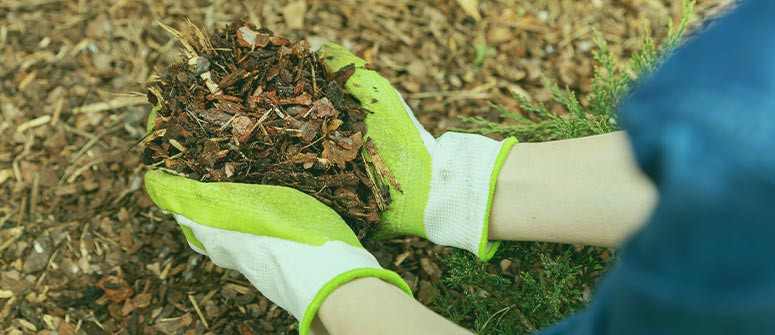
There are many ways to provide the necessary nutrients to cannabis plants. But there aren't many that also help to retain moisture, protect against pests and (undesirable) weeds, and enhance drainage and aeration. Mulching does all of this, and more! Here's all you need to known about mulching marijuana.
Contents:
In the quest for bigger, stronger, better cannabis, growers employ all sorts of tips and tricks. Some of these undoubtedly produce an effect; others are more dubious. So, before you try anything unusual to improve the quality of your cannabis plants, you must try mulching!
Mulching is often free, totally natural, and works wonders for weed plants! In this article, we explain what mulching is, which materials make the best mulch for cannabis, and how to do it.
What is mulching in relation to cannabis plants?
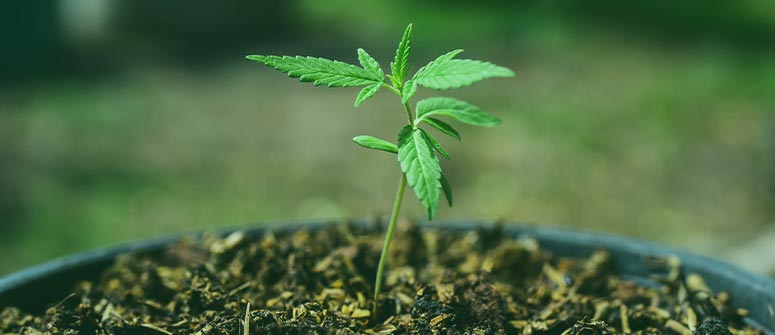
Mulching is a very simple yet effective practice that involves covering the soil above a plant's roots with dead organic material. This material can range from dead leaves to seaweed. Ultimately, though, all materials serve the same broad purposes, such as trapping moisture and providing a source of food.
In nature, the ground tends to be covered in a mixture of living and dead matter; it is very rare for a natural environment to have bare topsoil. Therefore, plants have evolved to expect a cosy covering above their roots.
Why should you mulch around cannabis plants?
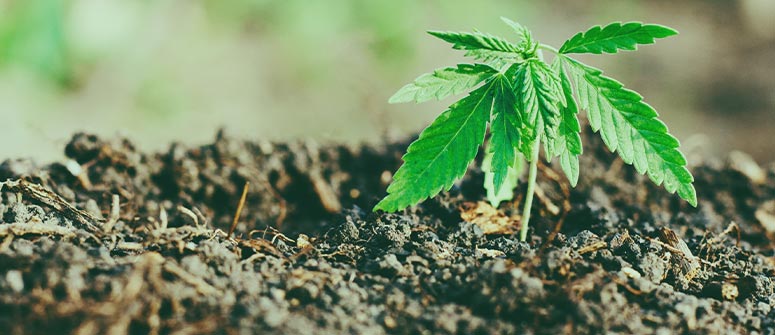
Mulching is highly recommended for outdoor growing. It is very easy to do and can greatly benefit the outcome of your grow. You can mulch indoors too, but it has fewer benefits compared to outdoors.
Below are some of the main advantages of using mulch in your cannabis grow.
1. Protection of the soil and roots
One of the major ways in which mulching can benefit your grow is by protecting the root systems of your plants. This occurs through various means.
First, mulching can help to maintain a more consistent temperature in the root zone. Though the temperature of your plants’ roots may not be the first thing you think of when looking to improve a grow, reducing temperature fluctuations below the ground can help your plants to thrive. Mulch helps to achieve this by stopping the soil from heating up immediately when it gets hot, and also by trapping heat when it gets cold.
Furthermore, mulching helps to prevent compression and erosion by providing a protective barrier between the topsoil and the environment. As such, the roots have greater protection, and other processes such as drainage and aeration are likewise protected.
2. Easier to remove weeds
Mulching significantly reduces the problems caused by weeds in a cannabis grow. If weeds begin to grow in a layer of mulch, you can just pull them out along with the mulch; then, you can simply lay down new mulch. If weeds grow directly in soil, then you need to carefully pull them out without damaging the soil too much, which can be difficult.
3. Healthier soil
Mulch is organic and dead, and thus it breaks down. This process is fantastic for cannabis, as it provides a natural and gradual release of nutrients—such as nitrogen—to your plants’ roots.
This method of feeding perfectly mirrors the means by which plants receive food in the natural world—the breakdown of dead organic matter above the soil. Therefore, mulching is one of the easiest, most natural, and most effective ways to cultivate healthy soil.
What’s more, not only does mulch encourage beneficial processes in your soil, but it also helps to protect against bad ones. The growth of harmful bacteria and fungi is reduced by the practice of mulching.
What nutrients make cannabis grow faster?
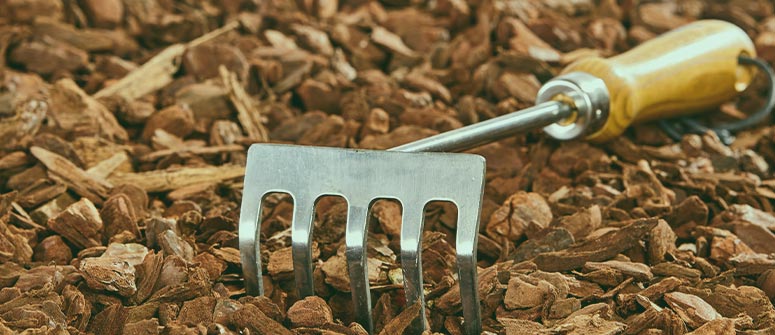
There are no tricks to make cannabis grow magically fast, but if you optimise the way you feed, you can help your plants to grow as quickly as their genetics will allow.
During the vegetative stage, cannabis plants have a strong desire for nitrogen, whereas they desire higher levels of phosphorus and potassium during the flowering stage. High-quality cannabis feeds should come in “veg” and “bloom” varieties and account for these differences, helping your plants to grow fast healthily.
All that being said, don’t overdo feeding. Plants will grow faster and healthier with too little feed compared to too much. So always start with a lower dose than that instructed by fertiliser retailers, and gradually increase the amount from there.
4. Helps to maintain moisture levels
Finally, mulching is brilliant for those who want to keep their soil moist for longer. This is especially helpful for those who grow outdoors in hot, sunny environments.
Mulch creates a damp, insulating layer above the soil, keeping it cool and moist. Thus, water in the soil hardly evaporates. In fact, mulch can help to retain up to 70% more water compared to bare soil. As well as reducing the need to water your plants, keeping the soil healthily moist promotes all manner of other benefits.
What kind of mulch can you use for marijuana plants?
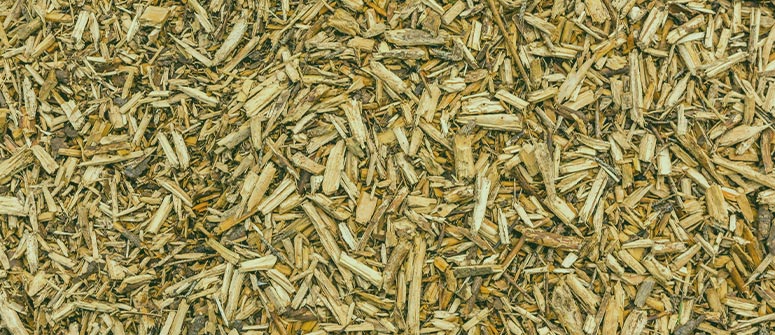
Mulch comes in many forms. As long as it’s made from organic material, holds moisture, and breaks down gradually, it should work!
But there are some materials that work better than others, and below we’ll go through each of them. When making your choice, it partially comes down to what you can get your hands on. While you can buy mulch at garden centres, it’s also pretty easy to collect on your own. So if you want to save money, get foraging!
Wood chips and bark
Wood chips and bark hold moisture very well and provide very effective protection for the soil and roots. However, these materials break down slower than other forms of mulch, meaning they aren’t necessarily the best food source. But you needn’t stick to a single kind of mulch! Why not combine bark and wood chips with a type of mulch that breaks down more easily to double the mulchy goodness?
Dry leaves
Dry leaves are one of our favourite options—for numerous reasons.
First, they enhance soil structure, meaning aeration and drainage are near-perfect. Second, they break down quickly and release an abundance of nutrients into the soil. After all, fallen foliage is one of the main food sources for plants that grow in a forest. Third, they’re free and accessible. Unless you live in an entirely treeless environment, you shouldn’t struggle to find enough fallen leaves to mulch your cannabis plants. While they are most abundant in autumn, dry, fallen leaves cover forest floors year round, meaning sourcing them shouldn’t be an issue.
Grass and garden cuttings
Cut grass, and other cuttings from a garden, also produce great mulch. If you can, mix up different garden materials—your plants will be very grateful. Not only will this mulch mix create a helpful structure, but it will break down at different rates and release a whole array of different nutrients into the soil.
Much like fallen leaves, garden cuttings are free to those who have gardens, or those with friends who do.
Straw
Yet another great mulch, straw is brilliant for trapping moisture and insulating the soil. Also, a particular benefit of straw is that it creates a habitat for various beneficial insects to live in. If you can attract these to your garden, then they’ll be very helpful in fending off undesirable insects that may prey on your cannabis plants.
Newspaper
Newspaper is another very accessible form of mulch. It may seem a surprising addition to this list, given it’s not a wholly natural material. Nevertheless, it breaks down very slowly, retains moisture, and insulates very well. However, it provides little in the way of nutrients, so it can’t replace a separate feeding regimen.
Seaweed (kelp)
Kelp is taking off as one of the best cannabis fertilisers available. You can buy kelp powder, kelp pellets, and more. But you can also use raw kelp to mulch your cannabis plants. If you live by the sea, harvesting kelp can be pretty easy (just check the legality of this practice in your region).
Kelp is packed with nutrients, and as such creates an incredible mulching material.
Where can I buy mulch for my cannabis garden?
For those who cannot collect mulch, or simply don’t want to, it’s easy enough to buy it online or from gardening centres. While it’s not as cheap as the free mulch you can collect yourself, it is still inexpensive.
Some products may be marketed as mulch, whereas others may be marketed under names such as “multi-purpose compost”. The main thing you’ll need to ensure is that your product is suited to being applied to the topsoil, rather than mixed into the soil.
How to mulch cannabis
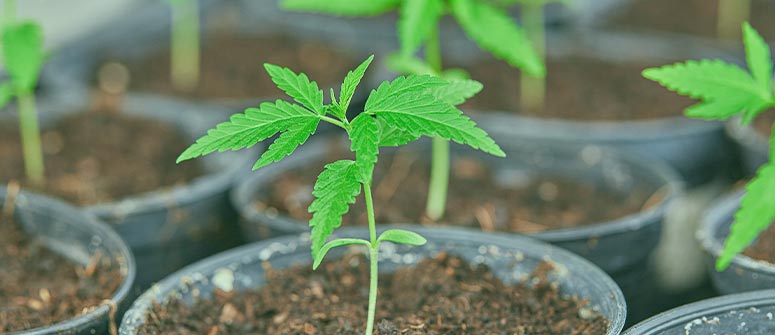
You can mulch at any time during your grow. Some growers mulch from the seedling stage onward, as a means to feed their plants and exploit mulch’s various other benefits. Other growers may only mulch if they think the soil needs rejuvenating.
So, you can mulch throughout a grow. However, you can also mulch outside of the growing season. In fact, doing so makes for a wonderful way to naturally revive spent soil.
For instance, if you have a bed that was used to grow plants the previous year, and you intend to use it again the coming spring, you can use mulch to restore its nutrient content so it’s ready to host new life during the next growing season.
In short, mulching is very easy, and you can do it at pretty much any point during or outside of the growing cycle. Just be careful if mulching around young plants, as their stems are very delicate.
Mulching: A great way to grow healthy cannabis
If you grow cannabis—or anything else for that matter—you should use mulch!
Mulching is very cheap (often free) and very, very effective. It protects roots, provides food, helps to deter pests and weeds, and retains moisture! What are the downsides? None that we’re aware of!
Mulching is particularly useful for relaxed organic grows, as it reduces the need to water and feed, all while increasing the health of your plants!
.jpg)
.jpg)

.jpg)
